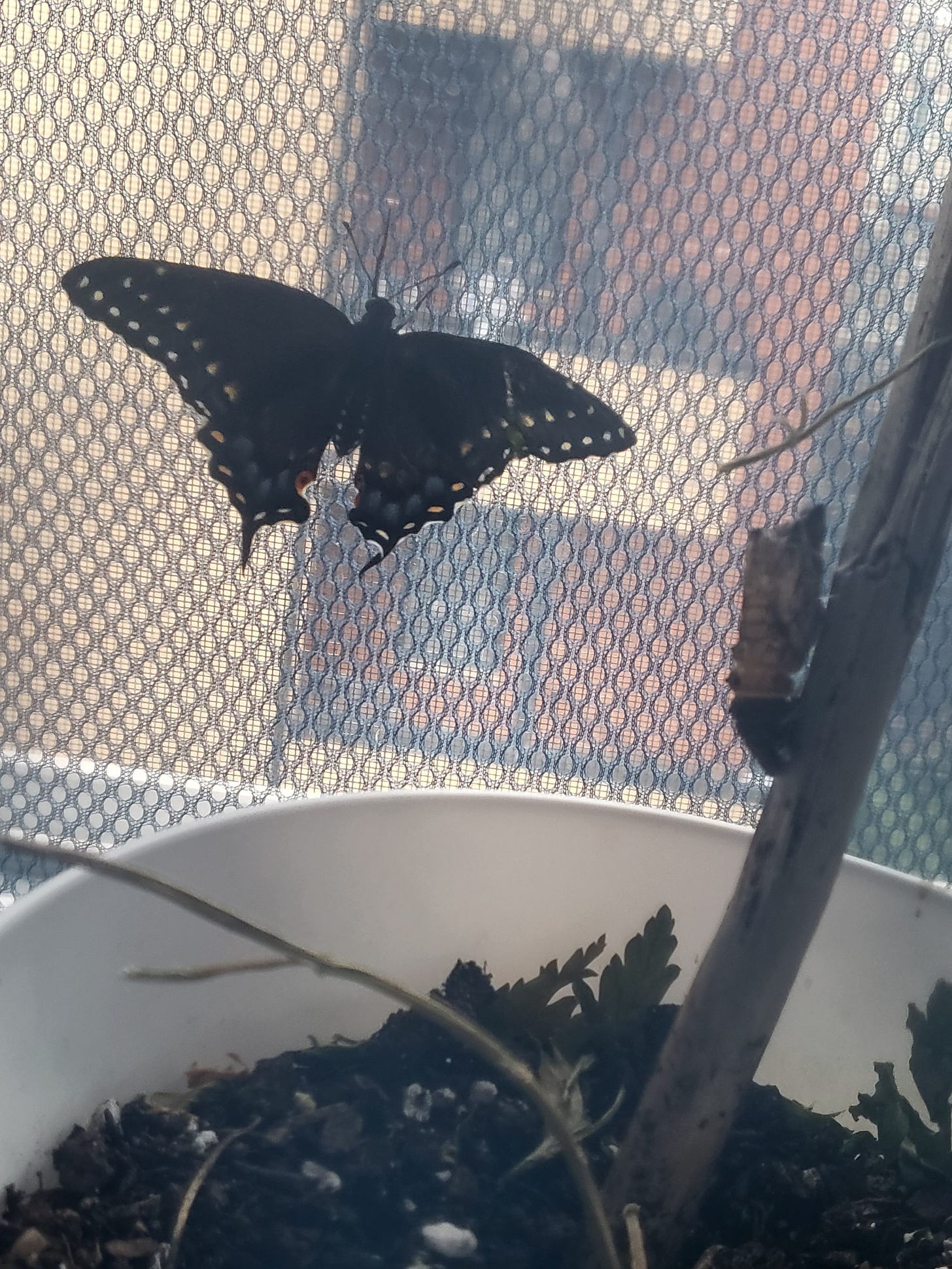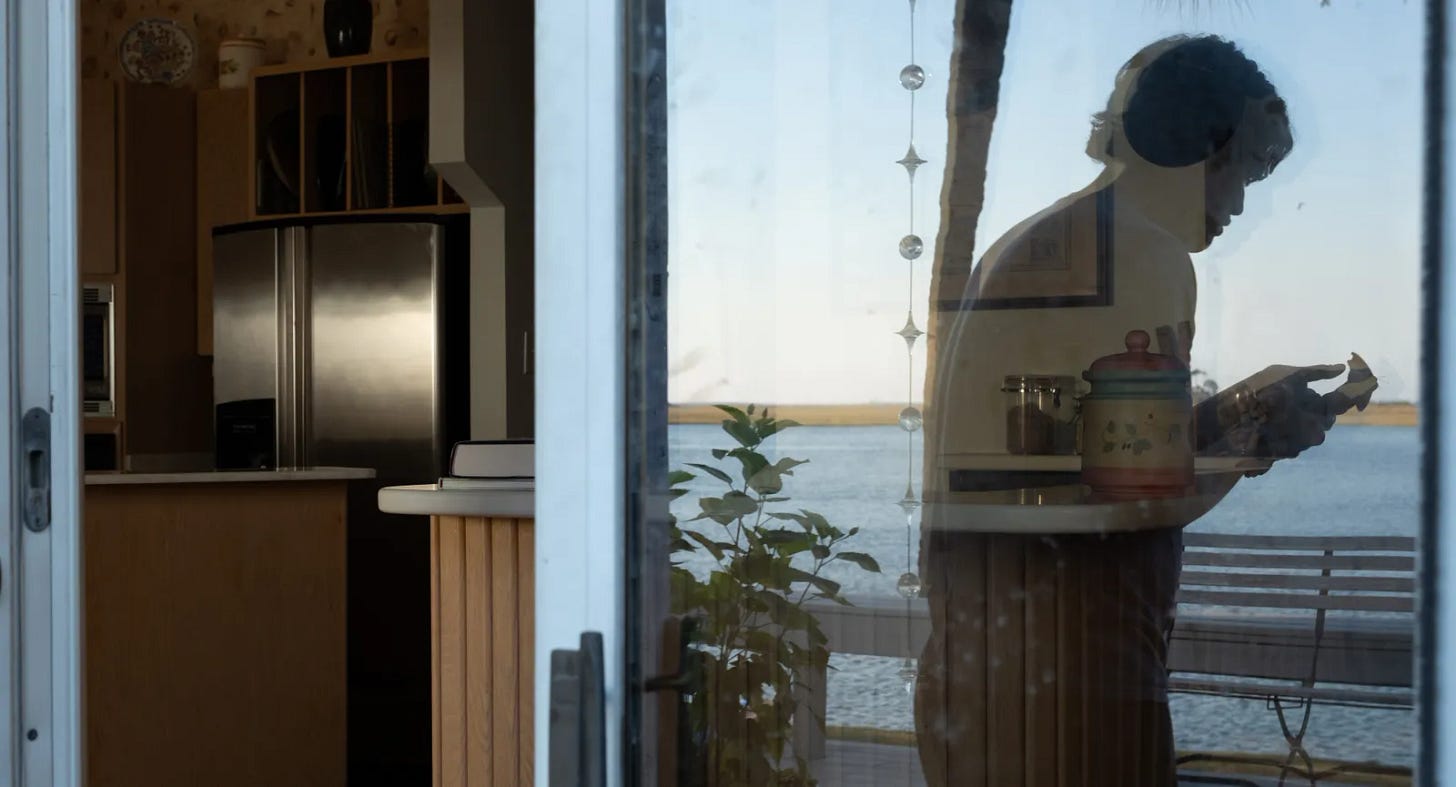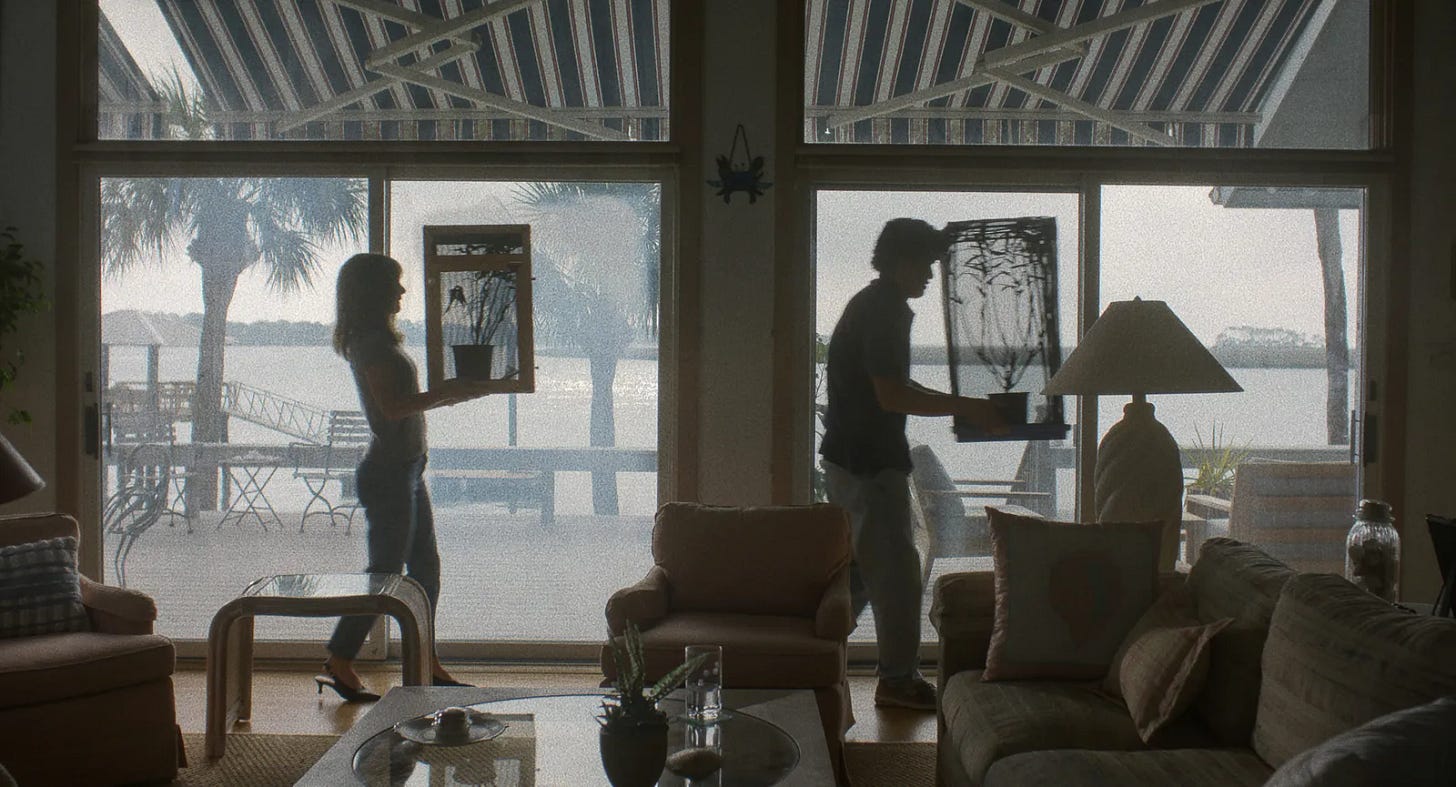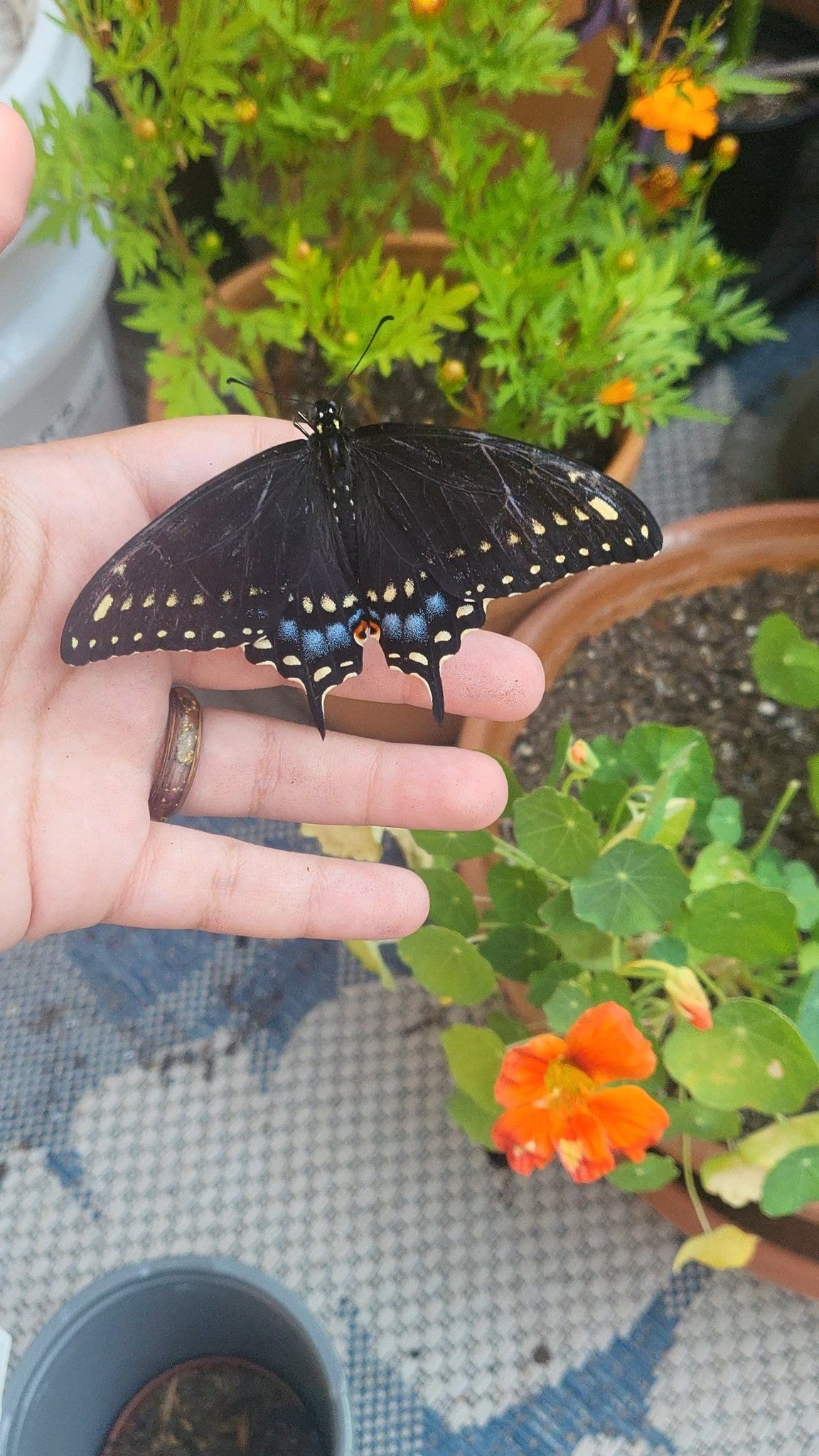Letting Them Go: 'May December,' Butterflies, and the Role of a Steward
Reflections on the symbolism in Todd Haynes' latest work from a gal who learned how to raise butterflies.
It isn’t until halfway through Todd Haynes’ prickly melodrama May December that we finally get a glimpse into Joe’s inner life. In a film riddled with suggestion, sensuality, and desire, the pent-up passion of this 36-year-old man (and former 13-year-old tabloid headline) spills over through one of the most innocent of interests: He raises Monarch butterflies. And in the passing period where it seems as though Elizabeth — the actress his age studying to play Joe’s wife and former middle school teacher Gracie — may have a genuine interest in Joe’s interiority, an interest he perhaps hasn’t felt from anyone else in any meaningful amount of time, he opens up, eager to be seen and heard.
“You just keep your eyes open. Look for the eggs, take them inside, protect them, so they have a chance to grow,” he explains, taking care to emphasize the impact of butterfly conservation. We see so little of Joe outside his relationship to Gracie, Elizabeth, and his children. He’s never been the one allowed to be the spokesperson for his relationship. Years ago, Gracie quickly learned how to spin her own PR, always the one in front of the cameras to assert the validity of the love she shared and shares with her former preteen student. Now, Elizabeth has inserted herself as the new face of Gracie and Joe’s marriage prepared to take on this “complex, human story.” Joe admits he always felt eyes on him — possibly due to the small community he grew up in, possibly as the only (“half”) Korean family in the neighborhood — but it’s clear he’s become accustomed to blending in. Quiet, never contradicting, always amiable. A life in the public eye never guaranteed a life of being known. In these small moments when Joe’s complexity cracks through his blank facade, only used to reflecting people’s perceptions of him, it is solemnly evident how desperate Joe is to be known.
In a film dripping with symbolic imagery, the butterflies in Todd Haynes’ May December feel like an easy, offhanded metaphor. As pollinators, butterflies immediately invoke the most rudimentary understanding of “the birds and the bees.” They’re a visual double entendre. They represent the most simplistic, colorful, hopeful imagery of childhood, but their sensuality, their transformative opening, their silky secretions, and their feather-touch kisses whisper of something far more tantalizing. Their magnificent patterns exist as a sign of warning to potential threats or a manipulation to appear more threatening themselves. Their flight equates freedom. Their delicateness equates to sweetness. The nature of their transformation equates resilience. Their dwindling populations remind us of their precarity. But as Gracie is so keen to remind her young husband Joe as she annoyedly references his careful butterfly stewardship, they’re “bugs,” their vibrancy, fragility, and life cycle flattened to an unseemly, small, disposable thing. While the movie’s runtime unfolds, Joe desperately tries to prove to everyone in his orbit that he is none of those things — and certainly that Gracie doesn’t see him that way. At 36, it would be embarrassing enough to realize you are a bug — not a feature — of your own family, that your wife views you as just another one of the small things in captivity that you keep in the living room, needing to be hidden and put away when your presence is inconvenient or upsetting.
For Joe, to realize that’s how he is seen by the woman 23 years his senior who snuck around with him in a backroom when he was only 13? Well, that would upend his understanding of his entire life. By Haynes’ design, we never uncover the entirety of Joe’s true self. But we learn this: Joe is a tender steward of butterflies.
The first time I raised butterflies, I was in 5th grade.
I received for Christmas a science kit aimed to teach children about the lifecycle from the comfort of their own homes — a box with brightly colored lettering advertising the opportunity to WATCH ‘EM GROW AND LET ‘EM GO! These butterfly kits are likely familiar from their ubiquity as a classroom teaching tool. Painted Lady butterflies, the most widespread butterfly species, are bred for these kits. They are the perfect candidates for a hands-on project for little ones still in the process of learning responsibility and care: They’re highly adaptable to any environment, can breed year-round, rely on camouflage as a defense mechanism at all stages of life (as opposed to other species covered in a variety of evolutionary skin irritants), and are not at risk for extinction. The appeal of the Painted Lady is also likely based on its similar appearance to the recognizable Monarch butterfly — without all the fussiness of rearing Monarchs. For all intents and purposes, the Painted Lady species is disposable. The conditions can be less than perfect and kids can mess up as they do when they are still in their own pupal stage, young and only beginning to understand a wider world.
Most of what I know about butterflies wasn’t learned in participating in these educational projects but was knowledge I pursued this past summer as I accidentally fell into the hobby of butterfly stewardship. Though I’ve made attempts to grow butterfly weed in our container garden, apartment living isn’t very conducive to attempting to aid in the conservation of dwindling species like the Monarch. In June, however, I was passing by the garden area outside of a Lowe’s, and upon glancing at an array of herb starters, noticed fat, green and black striped blobs along the stems of two plants. Quick googling told me that they were Black Eastern Swallowtail caterpillars, a common species, even in my city of Chicago. Despite their commonality, my feet were glued to the pavement outside. I was struck with a maternal urge to protect them. Was it a maternal urge, though, or a guilty one? Humanity had paved paradise, and put up a parking lot, and in this parking lot were five caterpillars fending for themselves on a tiny amount of parsley for sale. There was a chance they’d be fine, able to make a lovely home of these plants, but I anxiously worried they would be picked off or killed for making the plant seem “unseemly,” or infested with pests. I was overthinking it. They’re caterpillars of a common species who had hacked it at least to their fifth instar (a term I would later learn) in an urban environment that Black Eastern Swallowtails had long survived in. But I could not walk away. I googled a few more things, ran to the next-door grocery store to grab a cheap mesh laundry basket and a cup for travel, bought the two parsley plants, and brought the little guys home.
And then? I fell in love. Their soft, green bodies went from giving me the willies to delighting me with their design. Working from home where I often felt cooped up while my partner went to work at an office, I would regularly spend time with them where I kept their makeshift habitat outside, wanting to just sit in silence and watch them crawl, eat, and grow. I spoke gently to them, gave them names (even though I couldn’t really tell the difference between them), and learned everything I could about raising butterflies. Later on, I’d purchase more parsley plants to keep my new friends fed and would discover additional eggs hidden beneath the leaves. I grew even more parsley to keep a steady supply, and one day watched as a traveling Swallowtail laid eggs on the container parsley. All in all, I ended up with ten caterpillars under my purview throughout the summer, officially turning into a practice of stewardship that I hope to continue.
My husband gave me a knowing, teasing glance as we sat in the theater, hearing Joe speak about his hobby in the same awed, yet self-conscious way I often found myself rattling off about these new creatures I was looking after. It had felt like a silly hobby to take on, and I immediately recognized in Charles Melton’s guarded performance that glimmer of a gentle inner child, unsure of whether protecting these small insects is a show of adult responsibility or a covert way of keeping that small part of yourself safe, kept away from its larger predators.
What does it mean to be a steward? I am childless and have only taken care of a handful of pets in my lifetime. I was an only child who never had to look after any siblings, but who did learn to look after herself at perhaps too young of an age while my parents dealt with the difficult challenges of marriage and money that parents try to keep behind closed doors, away from curious eyes with so little understanding of the magnitude of existence. I don't know what it would mean to be responsible for someone so young and vulnerable, to be the person guiding them through the world, and as the world feels like it becomes more and more horrible, I question whether I ever possibly could be in that position. I want kids, I think, but that role terrifies me. There are days when I can hardly steward myself as an adult, certainly days when I cannot fathom how humanity collapses within itself. How could I lead someone so small, so excited by the prospect of a blooming, open world into an existence that at times, to me, feels limited and decaying? I do not know what it means to be a steward, I only know how I wanted to be held by the hand as a child, the moments where I felt warmly protected, the days where I felt isolated and fragile, and what I know can never be changed — even some things that can never be understood.
When raising butterflies, much emphasis is placed on the “emergence.” It is the moment you’re working towards — when your hard work pays off and you watch as the once-caterpillar emerges from its chrysalis as a fully formed butterfly, no longer content to stay within the confines of its netted cage. It has new instincts to explore that are difficult to provide in captivity. The release of the butterflies is a moment of theater: This creature does the incredible in its transformation, and we are infinitely fascinated with the idea of it happening before our very eyes.

I had an adult man who mentored me in high school. He had known me since I was 14, and throughout my teen years, I would see a lot of myself in him — who I was in that moment who I wanted to be. We were friendly and familiar with one another. To my memory, this mentor never veered into the sexual with me. But I grew to become hopelessly infatuated with him, romanticizing our connection and seeking out every possible opportunity to spend time with him, opportunities where I was seldom — if ever — turned away. There were weeks at a time when I’d spend extra time alone with him in his office for reasons I can hardly recall. He was a workaholic and I was at the early stages of my own challenging relationship with labor and time and worth, all mixed up together, blurring the lines of a work-life balance, blurring the lines of my identity. I still see currents of this mentor’s relationship and approach to his career running through me nearly 15 years later after a series of work and work-adjacent relationships where I have struggled to manage boundaries and have been taken advantage of by a superior’s nonexistent boundaries. Oftentimes I do not know who I am outside of my work. I wonder how different I would be now if I was mentored differently, if “work” didn’t consume my life as a teenager, frequently as a means to spend more time with the object of my desires.
I’ve long wondered if memory is a thing that transforms over time as our later wisdom clarifies it, or if our memories only feel transformed as distance muddies them. Glimpses stick out: Putting his arm around me for a photo and not removing his hand from a swath of exposed skin on my waist; Talking alone with me in a room and abruptly standing up and moving further away when another person entered; Lingering in another room alone with me long after he should have left, tensely standing next to each other in silence; Offering to lend me his car when I left something at home; Asking me questions and holding conversations with me over email at 8, 9 PM. But all I can rely on is a memory that can only offer questions, not answers. After all, these things all could have an innocuous explanation. But wasn’t I obvious in my infatuation? Why wasn’t he uncomfortable with how close I was? Why didn’t he just draw a line?
I’ve wondered whether my butterfly habitat truly exists to keep these creatures safe or rather because it gives me a sense of purpose to keep them around. But it is harder and harder to convince yourself otherwise once they’ve emerged. It is a fine line between acting as protector and captor. The most important lesson I’ve learned in my stewardship is that you must let them go, no matter how they make you feel.

Joe knows this. It’s why he’s a good steward. After finally coming to terms with the possibility that Gracie was not his protector — that he was raped, that he missed out on an entire childhood, that he is captive in his own home — he awakes on the morning of his children’s graduation. They are his age when he had them, and perhaps even further along mentally and emotionally. He’s watched as they’ve passed him by, and now they’ve emerged. There are strong indicators that once these children leave, they will not come back, and though Gracie’s manipulations just as equally shape them, they are the ones who can leave. What can Joe do? He’s been kept in a cage far too long as it is. His entire conception of adulthood revolves around Gracie. He never had a chance to have dreams or opportunities. He never had a chance to be known. He feels obligated to Gracie. Bitterly, they have their isolation in common. In the brief glimpses of freedom Joe thinks he’s found in Elizabeth, he comes to realize he’s equally a prop in her eyes. Empty of interiority, empty of purpose. A butterfly that emerged with its wings crumpled, unable to fly.
Sometimes, I wish my mentor and I could just talk. I wish I just knew, because at least then I could make sense of things. I want to believe that I’m not crazy, that our relationship was strange and perhaps bordered on inappropriate, that things shouldn’t have happened that way. But I also want to believe he is not a monster, because he was a person who I truly loved at one point in my life, and for better or worse, he is intrinsically a part of who I am. Our relationship came before I was fully formed, still trying to make sense of what it meant to move through the world. I wonder if he ever understood that. I wonder if he felt like a kid himself, unable to shake the attention and validation I was showering him with. And I also wonder if it’s all in my head — that it was a boilerplate relationship between mentor/mentee that I built up in my head. I wish I could ask him point blank, “Did you want to fuck me when I was 16?” — and that he could just answer honestly and that we could talk about it, talk about that point of our lives, be honest about all the things I was confused about as a kid, honest about how he could’ve been better regardless of what his answer is — that I wouldn’t have to be so alone in my healing of whatever the hell this relationship was. Even if the answer is “yes,” I reason that he’s the kind of person I believed him to be at his best, far away from a monster. Once responsible for me and made some missteps, sure, but complicated, human, and able to understand what he did wrong and be better for it. I wish and wish and wish, but I will never know. Not really. I can only understand who I was before the relationship and who I turned into after. What happened inside the chrysalis remains mysterious, but regardless, it happened, and I will forever be transformed on the other side.
As fascinated as I was with my little caterpillar friends, I was taken aback by the emotional pride I felt when the first butterfly emerged from her chrysalis — beautiful, strong, with shining blue wings. I wished I could watch her forever, but she emerged without complication, was healthy, and was ready to be let go. There was no more work I could do to keep her safe that wouldn’t impede on her quality of life or duty as a pollinator. It’s in her design and instinct to spread her wings and float above the currents of the wind in a whole variety of conditions. I urged her onto my hand, bringing her out into the world, prepared to step back. She was generous and landed on a flower in our garden, resting there for hours longer, giving far more time to me than she needed to. And then… she took off, never to be seen by me again.
In the final moments in which we see Joe, he is saying goodbye. A Monarch has emerged. He is alone. No Gracie over his shoulder. No Elizabeth. No kids, for a moment. Carefully, he removes the butterfly and does what you must do: He lets it go. He stares off at this one little thing he has put out into the world, a positive impact of conservation that gently flitters off toward the horizon of this beautiful, isolated community Joe has lived in all his life. He stands in the doorway, knowing that freedom exists for the butterfly, but not for him.
And then he is releasing his children. He watches with sorrowful pride as they exit the car. This moment is just for him — Gracie went off hunting, a violent contrast to Joe’s work stewarding nature.
In his butterflies, with his children — he is no expert. He sees them go off to the life he never had, and will likely never have. But he knows one lesson that the adults around him and the women he is caught between refuse to take to heart. You must let them go. ✿
It’s a new year, and I hope to be writing here again with some sort of frequency. Thank you as always for following this little intermittent blog, and I hope you had a wonderful close to 2023.





